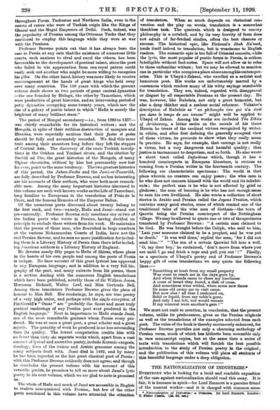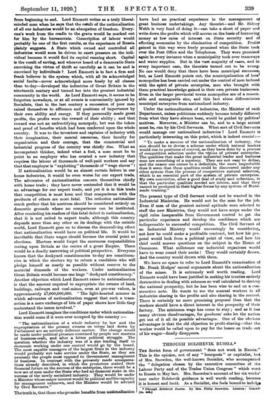THE NATIONALIZATION OF INDUSTRIES.* EVERYBODY who is looking for a
lucid and readable exposition of the case against nationalization should read this essay. It is fair, it is humane in spirit—for Lord Emmott is a genuine friend of the manual worker—and it is charged with common sense • Nationalization of Induitries: a Oritiounn. By Lord Emmott. London : T. Maher uawin. [Si, dd. net.]
from beginning to end. Lord Emmott writes as a truly liberal- minded man when he says that the result of the nationalization of all our industries would be an abnegation of freedom. Every. one's work from the cradle to the grave would be marked out for him by the bureaucrats. Conscription of labour would probably be one of the first results, as the experience of Russia plainly suggests. A State which owned and controlled all industries would soon be driven to exert pressure on the indi- vidual because it would find its capital running short. Capital is the result of saving, and whoever heard of a democratic State exercising the virtue of thrift so carefully as it can be and is exercised by individuals ? Lord Emmott is in fact a firm and frank believer in the system which, with all its acknowledged social faults—never acknowledged more freely by all classes than to-day—developed the industries of Great Britain in the nineteenth century and turned her into the greatest industrial community in the world. As Lord Emmett says, it seems to be forgotten nowadays, or at all events is conveniently ignored by Socialists, that in the last century a succession of poor men raised themselves to affluence and positions of importance by their own ability and energy. If they personally made great profits, the profits were the reward of their ability ; and that reward was not an unfructifying monopoly, but was the token and proof of benefits which had been conferred upon the whole country. It was to the inventors and captains of industry with their imagination, their mental resources, their faculty for organization and their courage, that the commercial and industrial progress of the country was chiefly due. What an incompetent thinker, indeed what a fool, a man must be to point to an employer who has created a new industry that requires the labour of thousands of well-paid workers and say that that employer is " exploiting " thousands of " wage slaves" ! If nationalization would be an almost certain failure in our home industries, it would be even worse for our export trade.
The advocates of nationalization concern themselves chiefly with home trade ; they have never contended that it would be an advantage for our export trade, and yet it is in this trade that competition is most keen and that comparisons with the products of others are most fatal. The orthodox nationalizer much prefers that his nostrum should be considered entirely on domestic grounds where no comparisons can be instituted.
After reminding his readers of this fatal defect in nationalization, that it is not suited to export trade, although this country depends more than any other on its dealings with the outside world, Lord Emmott goes on to discuss the demorali'ing effect that nationalization would have on political life. It would be inevitable that State wages should become the crucial point at elections. Electors would forget the enormous responsibilities resting upon Britain as the centre of a great Empire. There would be a deadly narrowing of political perspective. Everyone knows that the dockyard constituencies to-day are constituen- cies in which the electors try to return a candidate who will pledge himself as nearly as possible without reserve to the material demands of the workers. Under nationalization Great Britain would become one huge " dockyard constituency." Another objection which Lord Emmott raises to nationalization is that the amount required to expropriate the owners of land, buildings, railways and coal-mines, even at pre-war values, is approximately £7,000,000,000. " The light-hearted manner in which advocates of natio i alization suggest that such a trans- action is a mere exchange of bits of paper shows how little they understand the issues involved."
Lord Emmott imagines the conditions under which nationaliza- tion would come if it were ever accepted by the country :—
" The nationalization of a whole industry by law and the expropriation of the present owners on terms laid down by Parliament are an entirely different matter. The change would be made under political pressure exercised by people not masters of business-craft, and after a bitter political struggle. The question whether the industry was of a size lending itself to economic working under one control would go by the board. The most capable managers of the largest firms in the industry would probably not take service under the State, as they are precisely the people most opposed to Government management of business. In contrast with the privately made amalgama- tions already described, in which the promoters staked their
financial future on the success of the enterprise, there would be a new set of men under the State who had no financial stake in the success of the newly socialized industry. They would be under a Minister whose major interest would be political and his capacity for management unknown, and the Minister would be advised by Civil Servants."
The truth is, that those who promise benefits from nationalization have had no practical experience in the management of great business undertakings. Any theorist—and Mr. Sidney Webb is very fond of doing it—can take a sheet of paper and write down the profits which will accrue on the basis of borrowing money at low rates of interest on State security and of effecting economies by the elimination of competition. Profits gained in this way were freely promised when the State took over the Post Office and the Telephones. They were promised again in every instance when a municipality took over tramways and water supplies. But in the vast majority of cases, and in every important case, the theorists turned out to be wrong.
No one would deny that there have been municipal successes,
but, as Lord Emmott points out, the municipalization of local monopolies has been carried out under the control of men imbued with the spirit of private enterprise, men who brought with them practical knowledge gained in their own private businesses. Even in the larger provincial towns monopolies are of a reason- able and manageable size, and this fact alone differentiates municipal enterprise from nationalized industry.
Under the nationalization of industries, the Minister of each Department, unless politicians suddenly become totally different from what they have always been, would be guided by political motives. Moreover, a Minister can be, and to a large extent mast be, ran by his Civil Servants. What sort of Civil Servants would manage our nationali7ed industries ? Lord Emmott is
particularly interesting on this point, which is indeed crucial :—
" To make a success of the nationalization of industry, the aim should be to devise a scheme under which natural leaders would rise to positions of control, as they have done by a process of competitive selection under the regime of private enterprise. The qualities that make the great industrial leader and business man are something of a mystery. They are not easy to define, and the nearer one comes to a definition, the more improbable does it seem that these qualities could be discovered under any other system than the process of competitive natural selection, which is an essential part of the system of private enterprise. My own conviction, after a good deal of study and reflection, is that the particular qualities needed are inborn, and that they cannot be produced in their higher forms by any system of State- made training."
The present type of Civil Servant would not be wanted in the Industrial Ministries. He would not be the man for the job. Even if men of the greatest natural aptitude were selected to staff the new Ministries, they would not have scope under the rigid rules inseparable from Government control to get the particular experience and develop the confidence which are
indispensable to successful competition. The Civil Servant of an Industrial Ministry would unceasingly be considering,
not how he could make a profitable contract, but how his pro. posal would look from a political point of view, and how his
chief could answer questions on the subject in the House of Commons. What millstones our industrial organizers would have to wear round their necks ! They would certainly drown.
And the country would drown with them.
We have no space to refer to Lord Emmott's examination of Mr. Frank Hodges' unreal arguments about the nationalization of the mines. It is extremely well worth reading. Lord Emmott would have been justified in making his treatise entirely destructive in dealing with schemes so well calculated to destroy
the national prosperity, but he has been wise to end on a con- structive note. He wants to see the manual workers in all industries sharing in the profits and also sharing in the control. There is certainly no more promising proposal than that the workers should have a direct interest in the prosperity of their factory. The minimum wage has come to stay ; and as it has many obvious disadvantages, for goodness' sake let the nation
get out of it all its possible advantages. One of the obvious advantages is that the old objection to profit-sharing—that the
worker would be called upon to pay for the losses on trade out of his wages—finally disappears.



































 Previous page
Previous page